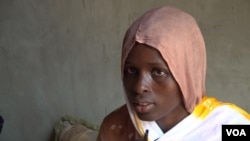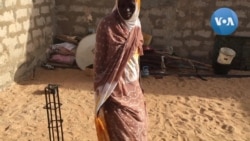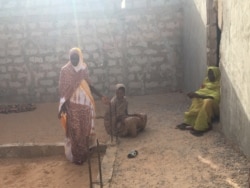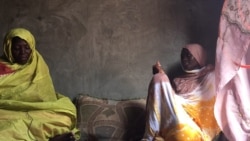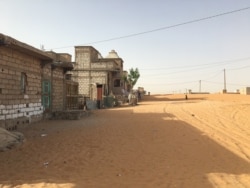Updated: July 7, 2019, 00:09 a.m.
M’Barka Mint Yarba doesn’t know how old she is.
Eight years ago, M’Barka moved with her family to the capital of Nouakchott from the city of Atar, where she was born into slavery. Although she has been freed, she has no official papers and no ability to acquire documentation required to attend school or work most jobs.
For the past eight years, M’Barka has worked as a housekeeper and cook for a family in the city.
“I clean and cook for a family in Nouakchott. The work is not too tiring, but I had to learn how to cook when I came here,” she explains.
M’Barka is one of an unknown number of Haratin, an ethnic group, in Mauritania who was born into slavery, also known as hereditary slavery.
Technically made illegal in the 1980s, slavery remains a pressing problem in the Sahara Desert country, according to groups such as Human Rights Watch and foreign governments, including the United States. Mauritania's government denies the allegations.
“Life is still difficult — there is no comfort,” M’Barka says, sitting on the floor of her family’s still-unfinished house.
Multiple organizations in the country work with limited funds to free slaves. Among them is SOS Esclaves, which has offices and contacts in cities nationwide, and is striving to be available to slaves who reach out to pursue their freedom.
As Elkory Sneiba, the organization’s communications director, drives to Mellah, on the outskirts of Nouakchott, a piece of paper slides off his dashboard.
“These are the 30 cases we’re currently working that are still open,” he says. SOS Esclaves says it can take seven or eight years for cases to be completed.
According to the U.S. State Department’s 2018 Trafficking in Persons Report, the Mauritanian government only investigated three cases of hereditary slavery between the springs of 2017 and 2018.
Mauritania has passed a long list of laws over the past 30 years criminalizing slavery and trafficking to various degrees. In 1981, Mauritania became the last country to legally abolish slavery, but it did not institute criminalization of the practice until 2007.
Still, hereditary slavery was not criminalized until 2015. Under that law, the crime is punishable by 15-20 years in prison.
But according to NGOs and international governments, Mauritania still lacks a clear will to criminalize the process, and often claims the issue no longer exists in the country.
“Efforts to address hereditary slavery remained weak. Despite serious concerns of official complicity and corruption in slavery cases, the government did not report any prosecutions or convictions of government officials complicit in human trafficking offenses,” the Trafficking in Persons Report reads.
According to SOS Esclaves’ lawyers, government officials and the courts will often prosecute slave owners for lesser charges, such as child labor, to reduce the country’s official statistics on the problem.
M’Barka’s mother, Oulmoulkhair, is one of SOS’s clients whose cases remain open eight years after she was legally freed. Oulmoulkhair's case includes her entire family.
To be freed, an official complaint must be filed with the courts, accusing masters of slavery. During the investigation period, masters may not find or reclaim those who filed the complaint.
“I am still waiting for justice and reparations — for all of the damage and loss we suffered at the hands of slave owners who left us without education and without documentation,” Oulmoulkhair says. Reparations would include receiving the official documentation required to work or go to school.
There are few reliable estimates of how many ethnic Haratin remain enslaved in Mauritania, but the Global Slavery Index estimated roughly 90,000, or 2.1 percent, of the entire population falls into that category.
Still, these figures are based on estimates provided by various NGOs. Reports by CNN and BBC quote figures, attributed to local sources, indicating as much as 20 percent of the entire population is enslaved.
The entire population of Mauritania itself is unknown as the country has not performed a census in a number of years. When it did, ethnicity was not taken into consideration.
Besides a lack of political will to fight, or acknowledge, the problem, NGOs and foreign governments have accused the Mauritanian government of denying entry and access to those pursuing information on modern slavery, as well as harassing and jailing anti-slavery activists.
In its 2017-2018 country report on Mauritania, human rights watchdog Amnesty International cited at least three anti-slavery activists in Mauritania who had been jailed. The report also stated that Mauritania refused an Amnesty delegation entry to the country.
The government has justified arrests of anti-slavery activists for protesting without permits and allegedly threatening the stability of the country.
Biram Dah Abeid, who recently ran for president of Mauritania and has officially contested the results of the election, is one such anti-slavery activist who was jailed for four years.
“I’ve endured all kinds of torture, and all kinds of barriers to supporting my people, supporting victims,” Abeid told VOA.
Abeid says that Mauritania not only needs a national, independent inquiry into prevalent cases of hereditary slavery, but needs to be aware of the challenges faced by freed slaves and other members of the Haratin ethnic group.
“We need plans for these social issues — for education, for sanitation, for social housing. There are a lot of measures to be discussed around the question of slavery,” he said.
And education is a big concern for M’Barka, who recounts watching her master’s children go to school and study the Quran. She does not anticipate having any such opportunities.
Still, Mbarka is hopeful about her future, confident that her life can only improve.




